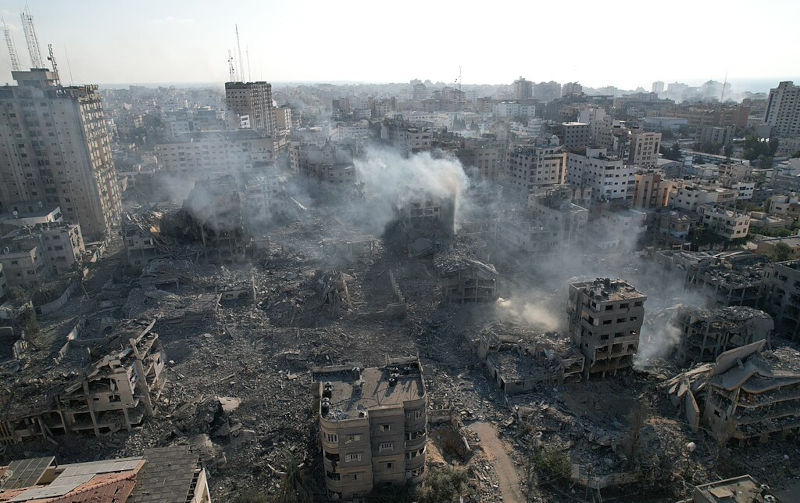A remote sanctioning of infanticide learnt from the US playbook
November 11, 2023
The practice of remotely and vicariously bombing cities and civilians is a longstanding technique of war over which the Israelis certainly have no ownership. Secretary of State Blinken has been trying to call time out. But the US has been the modern day architect of this brutal and destructive weapon of war.
They joined the British in the infamous bombing of the German city of Dresden in the concluding months of WWII. 4000 tonnes of bombs and incendiary devices levelled 6 square km of the citys centre killing around 25,000 people most of whom were civilians. That was a modest precursor to the single most destructive bombing raid in history that of the US Airforces attack on Tokyo on 4-5 March 1945 when 16 sq km of central Tokyo was destroyed killing an estimated 100,000 people and making one million homeless. There followed the nuking of the cities of Hiroshima and Nagasaki with their death tolls of between 150-200 thousand.
The Americans growing penchant for the use of massive indiscriminate force in war reached its apogee in the Vietnam war. Between 1965 and 1975 the US (modestly aided by its allies) dropped 7.5 million tonnes of bombs on Vietnam, Laos and Cambodia double that dropped on Europe and Asia in WWII and the largest bombing campaign in human history. Again, by far the largest part of this campaign was indiscriminate with an estimated 627,000 civilian deaths in Vietnam alone. If the effects of agent orange are added some estimates put civilian deaths in the several millions. Civilian deaths from US bombing of Hanoi was said to be between 30-65,000.
Nowadays the capacity for remote indiscriminate bombing of civilians has been given an exponential uplift with the technological advances in rocketry and drones. In this way, the morality of killing in war and in particular that of civilians has been transformed. Reports of Hamas shooting of men women and children in cold blood are by far the most dwelt upon events of the Israeli Palestinian conflict. Not equally vilified are those who remotely killed families by flicking the bomb releases and rocket guidance switches. And far less vilified are those skilfully steering drones to their human targets while seated in air conditioned comfort of remote offices. The largely unseen outcomes of these forms of warfare are, of course, no less deadly, no less shocking, no less brutal. Here lies the danger as technology automates and facilitates remote warfare: it is sanitised to the point of becoming everyday. Who would compare an Israeli drone operator with a crazed Hamas murderer when the former merely has a day at the office?
Perhaps not Biden or Blinken. They indeed confess to be horrified by the death of so many small children but refuse to call for a ceasefire. For some that might represent a remote sanctioning of infanticide.
Of course the levelling of Gaza city should never have been retained by the Israeli government as a strategy of war and indeed was clearly one to be avoided. For even if the bombing does eliminate the Hamas leadership, to merely return the Palestinians to an enforced imprisonment provides no solution and makes the physical destruction of Gaza city utterly without reason. Left is a burning resentment of which the US can well speak to. And Netanyahu would have appreciated that by sealing off the Gaza pressure cooker without a safety valve there would be explosive consequences of his own making sooner or later. Netanyahu surely beckoned the Hamas explosion and the retribution on Gaza - by undermining any hope of a two state solution through his progressive colonisation of the West Bank and trying to truss up his adversaries in Gaza in a perpetual status quo limbo.

